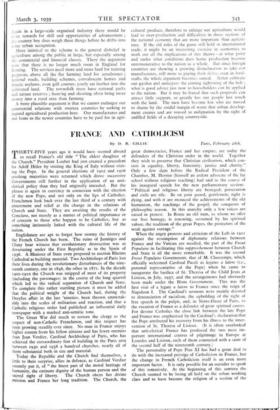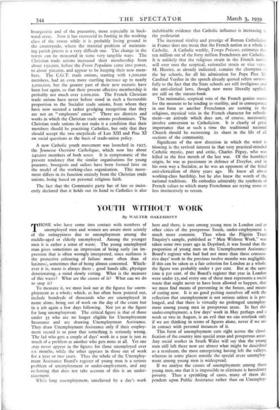FRANCE AND CATHOLICISM
By D. R. GILLIE
Paris, February 28th.
THIRTY-FIVE years ago it would have seemed absurd to recall France's old title " The eldest daughter of the Church." President Loubet had just created a precedent for Adolf Hitler by visiting the King of Italy without visit- ing the Pope. In the general elections of 1902 and 1906 crushing majorities were returned which drove successive Governments still further in the application of an anti- clerical policy than they had originally intended. But the phrase is again in currency in connexion with the election of the new Pope, and not only on the lips of Catholics. Frenchmen look back over the last third of a century with amazement and relief at the change in the relations of Church and State. They are awaiting the results of the Conclave, not merely as a matter of political importance or of concern to those who happen to be Catholics, but as something intimately linked with the cultural life of the nation.
Englishmen are apt to forget how stormy the history of the French Church has been. The ruins of Jumieges and Cluny bear witness that revolutionary destruction was as devastating under the First Republic as in the Spain of 1936. A Minister of State even proposed to auction Rheims Cathedral as building material. Two Archbishops of Paris lost their lives during the revolutionary disturbances of the nine- teenth century, one in 1848, the other in 1871. In the decade 190o-1910 the Church was stripped of most of its property (including the parsonages) in the course of the long quarrel which led to the radical separation of Church and State. To complete this rather startling picture it must be added that the political weight of the Church had, during the Dreyfus affair in the late 'nineties, been thrown unmistak- ably into the scales of militarism and reaction, and that a Catholic religious order had published an influential daily newspaper with a marked anti-semitic tone.
The Great War did much to restore the clergy to the respect of non-Catholic Frenchmen, and this respect has been growing steadily ever since. No man in France enjoys higher esteem from his fellow citizens and has fewer enemies than Jean Verdier, Cardinal Archbishop of Paris, who has achieved the extraordinary feat of building in the Paris area between 193o and 1938 a hundred churches, nearly all of them substantial both in size and material.
Today the Republic and the Church find themselves, a little to their surprise, allies in defence, as Cardinal Verdier recently put it, of " the finest part of the moral heritage of humanity, the eminent dignity of the human person and the sacred right of liberty. The Church obeys her divine mission and France her long tradition. The Church, the great democracies, France and her empire, are today the defenders of the Christian order in the world. Together they wish to preserve that Christian civilisation, which con- sists in equality, liberty, fraternity, justice and charity." Only a few days before the Radical President of the Chamber, M. Herriot (himself an ardent advocate of the lay school without religious teaching) had said in the course of his inaugural speech for the new parliamentary session: " Political and religious liberty are besieged; persecution and exile are rife. Be on your guard, gentlemen; right is dying, and with it are menaced the achievements of the old humanism, the teachings of the gospel, the conquests of philosophic reason. In this anarchy only a few voices are raised in protest. In Rome an old man, to whom we offer our free homage, is renewing, sustained by his spiritual valour, the tradition of the great Popes, the protectors of the weak against outrage."
When the angry protests and criticism of the Left in 1921 against the resumption of diplomatic relations between France and the Vatican are recalled, the part of the Front Populaire in facilitating this rapprochement between Church and State is all the more remarkable. It was the second Front Populaire Government, that of M. Chautemps, which officially welcomed Cardinal Paceli as legatus a latere (i.e., personal representative of the Pope) when he came to inaugurate the basilica of St. Theresa of the Child Jesus at Lisieux, in July, 1937, and the arrangements had obviously been made under the Blum Government. This was the first visit of a legate a latere to France since the reign of Napoleon I. The Cardinal's sermons were mainly devoted to denunciation of racialism, the upholding of the right of free speech in the pulpit, and, in Notre-Dame of Paris, to the vocation of France as a defender of great spiritual causes. For devout Catholics the close link between the late Pope and France was emphasised by the Cardinal's declaration that the Pope attributed his recovery from his illness to the inter- vention of St. Theresa of Lisieux. (It is often overlooked that anti-clerical France has produced the two most im- portant international centres of pilgrimage in Europe at Lourdes and Lisieux, each of them connected with a saint of the second half of the nineteenth century.) The personality of Pope Pius XI has had a great deal to do with the increased prestige of Catholicism in France, but the change in French Catholicism itself is an even more important factor. It is only possible for an outsider to speak of this tentatively. At the beginning of this century the Church seemed to be losing all hold on the urban working class and to have become the religion of a section of the bourgeoisie and of the peasantry, more especially in back- ward areas. Now it has recovered its footing in the working class of the towns while it is probably losing ground in the countryside, where the material problem of maintain- ing parish priests is a very difficult one. The change in the towns can be measured in some very tangible ways. The Christian trade unions increased their membership from about 150,000, before the Front Populaire came into power, to about 500,000, and appear to be keeping their new mem- bers. The C.G.T. trade unions, starting with 1,200,000 members, had an even more startling increase up to nearly 5,000,000, but the greater part of their new recruits have been lost again, so that their present effective membership is probably not much over 2,000,000. The French Christian trade unions have never before stood in such a favourable proportion to the Socialist trade unions, from whom they have now secured a rather grudging recognition that they are not an " employers' union." There are districts and works in which the Christian trade unions predominate. The Christian trade unions do not make it a condition that their members should be practising Catholics, but only that they should accept the two encyclicals of Leo XIII and Pius XI on social questions as the basis of trade-union policy.
A new Catholic youth movement was launched in 1927, the 7eunesse Ouvriere Catholique, which now has about 240,000 members of both sexes. It is symptomatic of the present tendency that the similar organisations for young peasants, bourgeois and sailors have been formed later on the model of the working-class organisation. This move- ment differs in its function entirely from the Christian trade unions, being based on personal religious faith.
The fact that the Communist party has of late so insist- ently declared that it holds out its hand to Catholics is also indubitable evidence that Catholic influence is increasing n. the proletariat.
The increased vitality and prestige of Roman Catholicis: in France does not mean that the French nation as a whole is Catholic. A Catholic weekly, Temps Present, estimates that ten million out of the forty million Frenchmen are Catholics. It is unlikely that the religious strain in the French nation will ever oust the sceptical, rationalist strain or vice versa. M. Herriot, as already indicated, remains the champion of the lay schools, for all his admiration for Pope Pius XI. Cardinal Verdier in the speech already quoted refers sorrow fully to the fact that the State schools are still irreligious and the anti-clerical laws, though now more liberally applied. are still on the statute-book.
The rationalist, sceptical vein of the French genius seems for the moment to be tending to sterility, and in consequence in one form or another Frenchmen are turning to the religious, mystical vein in the French character for refresh- ment—an attitude which does not, of course, necessarily involve conversion to Catholicism. It is clearly of great importance that at such a time the traditional national Church should be recovering its share in the life of all sections of the community.
Significant of the new direction in which the wind is blowing is the revived interest in that very practical-minded Catholic mystic, poet and critic, Charles Peguy, who was killed in the first month of the last war. Of the humblest origin, he was as passionate in defence of Dreyfus, and in his own way a Socialist, as he was an opponent of the blind anti-clericalism of thirty years ago. He knew all about working-class hardship, but he also knew the worth of the national traditions. He embodies admirably the synthesis of French values to which many Frenchmen are trying more or less instinctively to return.



























































 Previous page
Previous page